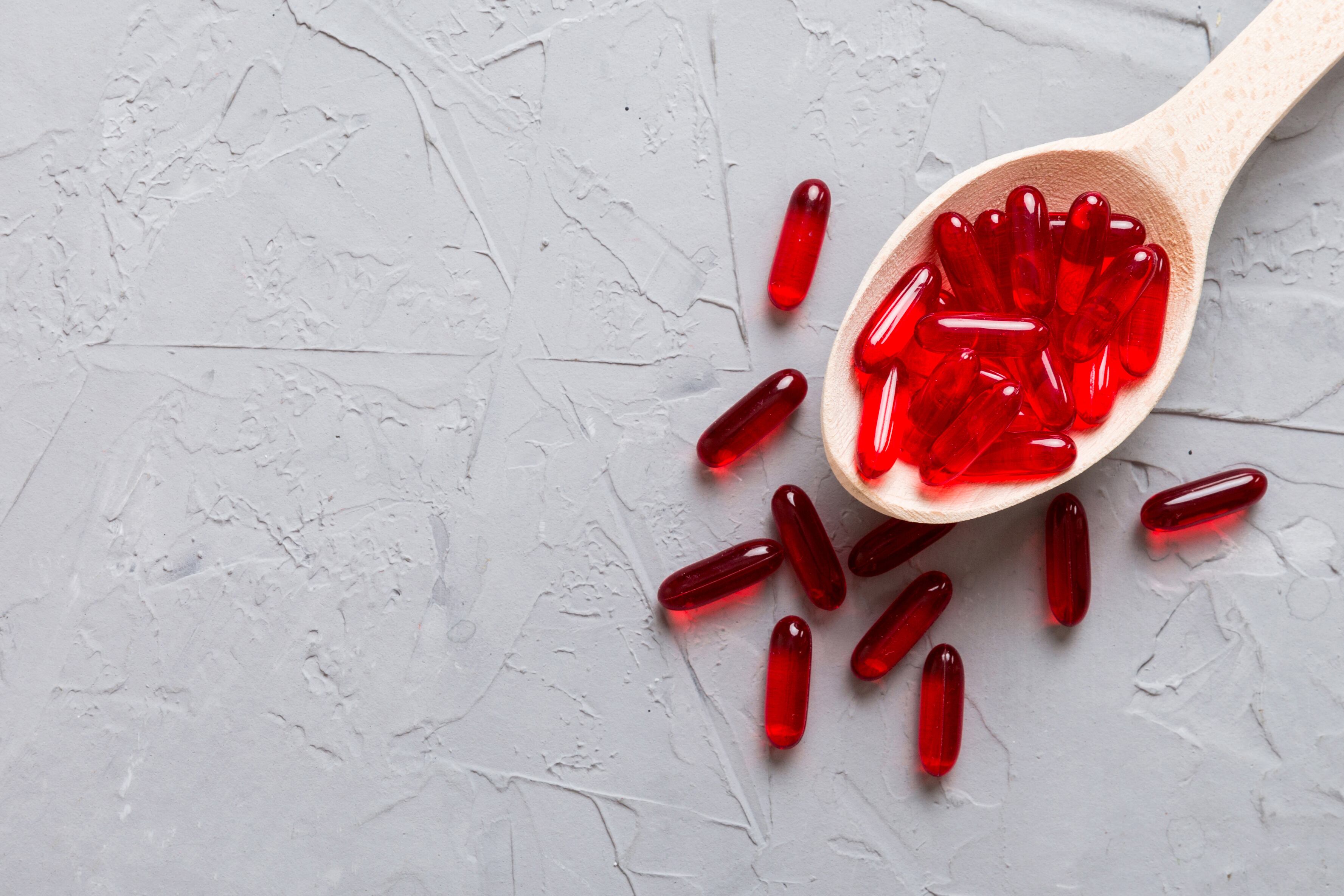Women exhibit distinct physiological and metabolic profiles that contribute to sex-specific health challenges including greater susceptibility to iron-deficiency, accelerated bone loss after menopause, hormonal imbalances, polycystic ovary syndrome (PCOS) and its related fertility issues, as well as mood and sleep disturbances.
Differences in hormone levels, body composition and gut microbiome composition can also influence how supplements are dosed, absorbed and metabolized in the body.
Below a look at some of the latest research featuring obese, pregnant, stressed, sleep-deprived, breastfeeding, athletic, sarcopenia-prone, pre-menstrua, menopausal, and health-conscious but iron-deficient women.
PMSoff shows promise as alternative to traditional PMS drugs
A study published in the Journal of Pharmaceutical Health Care and Sciences investigates the efficacy of PMSoff, a supplement combining herbal extracts, vitamins and minerals, in alleviating PMS symptoms.
“PMSoff may exert a synergistic effect through its multi-ingredient formulation, potentially targeting different pathways involved in PMS symptomatology, such as inflammatory cytokines, hormonal fluctuations, serotonin modulation and neurochemical regulation, targeting both the psychological and physical components of PMDD,” the Iranian research team wrote.
Conducted with 218 women, the double-blind, placebo-controlled trial revealed that PMSoff significantly reduced symptom severity compared to a placebo.
The supplement, formulated by Dr. Hamid Reza Sheikh Roshandel of theT’aam Asrar research institute, includes ingredients like lavender, valerian, spirulina, and vitamin B1, which individually have anti-inflammatory and mood-stabilizing properties.
Monteloeder botanical blend delivers measurable skin benefits
A study published in the Journal of Dermatology & Cosmetology evaluated the effects of Monteloeder’s Eternalyoung botanical blend on skin aging.
Conducted over 12 weeks with 71 women, the randomized, double-blind, placebo-controlled trial revealed significant improvements in skin parameters, including a 23% reduction in forehead wrinkle volume and enhanced skin radiance and moisture retention.
The blend, composed of four botanical extracts, aims to address skin aging through mechanisms such as oxidative stress reduction and telomere protection.
“This study indicates that daily supplementation with Eternalyoung is associated with notable and clinically observed improvements in the key aspects of skin aging,” said Nuria Caturla, PhD, chief R&D officer for Monteloeder, a subsidiary of Suannutra. “We witnessed its ability to help improve the appearance of smoother skin, more even tone, enhanced radiance and moisturization, especially in subgroups with a compromised skin barrier.”
Despite showing promising results, the researchers noted study limitations including the exploratory sample size and short duration.
Meta-analysis supports vitamin K2’s bone health benefits
A meta-analysis published in Frontiers in Endocrinology highlights vitamin K2’s significant benefits for bone health, particularly in postmenopausal women with osteoporosis.
“These findings support the potential role of vitamin K2 in improving bone metabolism by enhancing osteocalcin carboxylation and possibly modulating bone turnover processes,” the researchers from Zhejiang Chinese Medical University wrote.
The study also noted K2’s cardiovascular benefits, with previous research linking adequate intake to reduced aortic calcification and lower mortality risks.
The researchers called for further long-term studies to confirm clinical benefits, such as increased bone mineral density.
Study: Dual benefits of Zooca calanus oil on cardiac and metabolic health
A study published in Metabolites highlights the dual benefits of Zooca Calanus Oil on cardiac and metabolic health, demonstrating significant improvements in diastolic heart function and insulin sensitivity after 12 weeks of supplementation in obese women with prediabetes.
The research, conducted by independent scientists from Leibniz University Hannover, observed enhanced metabolic markers, including the Met-S score and TyG-WHtR, alongside improved diastolic function, underscoring the oil’s preventive potential in cardiometabolic health.
“The improvement in diastolic function was unexpected, particularly since participants were not preselected for cardiac dysfunction,” said Snorre Angell, CEO at Zooca, noting that diastolic dysfunction is an early and often silent sign of cardiovascular disease. “This makes the observation especially interesting from a scientific perspective.”
Despite the promising results, further investigation is needed due to the study’s exploratory nature and the absence of a placebo group. The outcomes, however, are consistent with previous findings on the oil’s cardiometabolic benefits and may help broaden understanding of the role of marine lipids in long-term wellness.

Research revealing high anemia prevalence calls for targeted screening
A study by Randox Health, Ulster University, and Antrim Hospital analyzed serum samples from 33,029 UK individuals, revealing high anemia and iron deficiency rates even among health-conscious women. It found that nearly one in 10 women were anemic, and one third had absolute iron deficiency, with functional iron deficiency common across all groups.
“Anemia and iron deficiency are rarely profiled in general populations and most data come from clinical settings or vulnerable groups, not health-conscious individuals,” said Mark Ruddock, chief scientific officer for Randox Health GB.
“Even among people actively monitoring their own health, iron deficiency and anemia were surprisingly common, especially in women of menstruating age. The study is important because early detection can prevent complications like fatigue, breathlessness, brain fog and pregnancy risks.”
As such, the researchers advocate for a national screening program to support early detection, particularly in menstruating women, to improve health outcomes and reduce healthcare costs. The study highlights the need for further research into diverse populations and the impact of chronic inflammation on iron metabolism.
Understanding the estrobolome: An untapped area in women’s health?
The estrobolome, a collection of microbial genes capable of metabolizing estrogen, plays a crucial role in women’s health by regulating estrogen levels and supporting hormonal balance.
Despite its importance, it is not widely recgnized but has significant implications for conditions like endometriosis and PCOS. Neurobiological scientist Dr. Siobhain O’Mahony and nutrition scientist Dr. Emily Prpa highlight the need for increased awareness, research and education to integrate the estrobolome into health discussions. They suggest that probiotics, prebiotics and dietary strategies could support the estrobolome, emphasizing gut care as a means to maintain hormonal health.
“The estrobolome is gaining traction in research but remains underrecognized by the public,” Dr. O’Mahony said. “Its complexity and lack of research and funding in women’s health have limited widespread understanding and clinical integration.”
NMN for hair? Mitsubishi Corporation Life Sciences on ‘first of its kind’ findings
A study conducted by Mitsubishi Corporation Life Sciences explored the effects of NMN supplementation on hair health in 15 Japanese women between the ages of 40 and 50.
The study found significant improvements in anagen hair elongation density and hair diameter, suggesting enhanced follicle maturation and nutrient supply. However, there was an unexpected decrease in total hair count, speculated to be due to seasonal hair loss.
NMN supplementation also increased energy metabolism-related metabolites, potentially supporting mitochondrial ATP production and contributing to improved hair volume and texture.
Gencor’s PEA offers stress management potential in university students
A study published in Frontiers in Nutrition explored the effects of supplementation with Gencor’s Levagen+ palmitoylethanolamide (PEA) on stress management in female university students. The research, involving a double-blind, placebo-controlled crossover trial with 16 participants, found that 600 mg of PEA per day improved heart rate variability (HRV), an indicator of stress resilience, without affecting salivary cortisol levels.
“This exploratory study demonstrates for the first time that PEA supplementation may enhance physiological resilience to stress as indicated by improved HRV,” wrote researchers from the University of Westminster, Anglia Ruskin University and Coventry University in the UK. “While subjective stress and emotional measures did not show significant changes, the observed trend suggests potential benefits in individuals experiencing moderate stress.”
They noted that further research in more diverse populations is needed to substantiate these findings.

Study unveils mechanisms impacting maternal health during vitamin D deficiency
A study published in the journal Nutrients explored the impact of vitamin D deficiency (VDD) on maternal health during early pregnancy, identifying 60 metabolites linked to VDD.
“This study provides new metabolomic evidence for the linkage between vitamin D and maternal lipid levels during pregnancy, along with clues about the mechanisms,” the report stated.
It highlighted the association between VDD and disturbances in lipid metabolism, with specific metabolites like glycerophospholipids and linoleic acid being affected.
Findings suggested that low vitamin D levels could affect broader metabolic pathways and emphasized the importance of linoleic acid for fetal development.
The researchers, affiliated with Zhejiang University in China, noted limitations such as the study’s cross-sectional design and small sample size, recommending further research for comprehensive understanding.
Arla whey protein isolate shows promise for maternal blood sugar management
Research published in Diabetes Care highlights the potential of Arla’s whey protein isolate, Lacprodan ISO.WaterShake, for managing blood glucose in women with gestational diabetes mellitus (GDM).
Conducted with Aarhus University and the Steno Diabetes Center, the study shows that consuming whey protein before meals can significantly lower postprandial blood glucose levels and increase insulin and incretin hormone secretion.
“Findings suggest that whey protein may be a safe, effective and promising nutritional strategy to support blood glucose management in women with GDM,” said Lise Høj Brunsgaard, research scientist at Arla Foods Ingredients.
However, the researchers caution that while the intervention may lower blood sugar after meals, it could also exhaust insulin-producing beta cells, suggesting a need for further long-term research.

Performance supplements research: Significant knowledge gaps for female athletes and certain sports
A review published in Frontiers in Nutrition highlights significant gaps in research on performance supplements, particularly for female athletes, with only 10% of studies focusing on this group.
“The findings underscore the critical importance of individualized supplementation strategies, moving beyond generic protocols to consider athlete-specific factors such as training status, competition schedule and physiological response patterns,” the report noted. “This personalized approach becomes particularly relevant given the observed variations in supplement effectiveness across different sporting contexts and athlete populations.”
Caffeine, certain amino acids, and probiotics show consistent benefits, while other supplements like vitamin D and CoQ10 have varying effects depending on the athlete’s baseline status and the sport’s demands.
The researchers also noted that 40% to 100% of trained athletes use supplements, often without proper guidance or evidence-based information, in the pursuit of marginal performance gains, making this knowledge all the more important.
Research deepens into creatine and the menopause transition
Researchers from the University of Novi Sad conducted a study published in the Journal of the American Nutrition Association, evaluating the effects of low-dose creatine hydrochloride and ethyl ester on cognitive and metabolic changes in perimenopausal and menopausal women.
The study found that creatine supplementation improved cognition and serum lipid profiles without side effects such as weight gain, which are common with creatine monohydrate. The results suggest that creatine hydrochloride, especially at medium doses, may offer significant health benefits for this demographic, prompting calls for further research to optimize dosing and explore long-term effects.
“I must say, this study truly surprised me with the notable effects observed at such a low dosage of creatine,” Sergej Ostojic, PhD, head of the Applied Bioenergetics Lab at the University of Novi Sad and co-author on the study.
“One intriguing factor might be changes to the blood-brain barrier during perimenopause, potentially allowing more creatine to enter the brain. Another possibility is related to the specific transport characteristics of creatine HCL (and CEE), which may enable these forms to cross via alternative pathways, thereby promoting favorable cognitive effects.”
Study supports shatavari benefits for perimenopausal women
A randomized, double-blind, placebo-controlled trial evaluated the effects of Xeya Modern Shatavari, standardized to 15% shatavarins, on perimenopausal women.
Conducted by Lifeline Hospital & Research Center in India, the study involved 75 women between the ages of 40 and 50 and demonstrated significant improvements in both somatic and psychological symptoms with shatavari (Asparagus racemosus) supplementation, particularly at a higher dose.
The research reported dose-dependent hormonal improvements and enhanced skin and hair quality, establishing shatavari as a promising natural therapeutic option for managing perimenopausal symptoms. The study, published in Functional Foods in Health and Disease, supports the efficacy of shatavari in promoting women’s health across various age groups.
Xeya Modern Shatavari is produced by Laila Nutra and distributed by New Jersey-based NXT USA.
Eric Anderson, managing director NXT USA, welcomed the study, stating: “Women’s concerns have been neglected for too long. This study shows real benefits for women dealing with perimenopausal symptoms, dramatically improving quality of life for the participants.

Vitamins C and E may combat muscle loss in older women
A study published in the journal Medicine explored the effects of vitamins C and E supplementation combined with resistance training on older women with sarcopenia.
Conducted by researchers from Liaoning University of Traditional Chinese Medicine, the randomized, double-blind, placebo-controlled trial involved 60 women between the ages of 60 and 75. Participants who received the vitamins alongside resistance exercises showed greater improvements in muscle mass, strength and certain biomarkers compared to the placebo group.
“Emerging evidence suggests that targeted nutritional supplementation may mitigate oxidative stress by augmenting antioxidant defense mechanisms,” the researchers wrote. “Among dietary antioxidants, vitamins C and E have demonstrated particular promise in attenuating oxidative damage through free radical scavenging and lipid peroxidation inhibition.”
Sanofi-Aventis Healthcare Pty Ltd, Australia provided the vitamins used in the study.
Omega-3s show promise for post-menopausal muscle health
A study in Spain evaluated the effects of omega-3 supplementation, specifically DHA-rich n-3 PUFAs, and resistance training on muscle health in overweight postmenopausal women.
Researchers in Spain investigated the impact of 16 weeks of an omega-3 supplementation provided by Spanish manufacturer Solutex, both alone and in combination with resistance training on muscle-related proteins, markers of inflammation, body composition and muscle strength in 71 overweight or obese postmenopausal women.
Results showed that resistance training alone improved muscle function, while omega-3 supplements enhanced muscle quality and cardiovascular markers. The combination did not significantly increase muscle size but improved strength and cholesterol levels, with decreased inflammation markers.
“This group is at elevated risk for sarcopenia, insulin resistance, and chronic low-grade inflammation—making it a critical target for early, non-pharmacological interventions," said Sonia Moreno, chief marketing officer at Solutex.
Folate and gene interplay may influence premenstrual depression occurrence
Researchers from the University of Toronto explored the relationship between folate intake and the MTHFR genotype in relation to premenstrual depression in a study published in the British Journal of Nutrition.
The study found that women with the T allele variant of the MTHFR gene who had low folate intake were at a higher risk of premenstrual depression. The risk increased with each additional copy of the genetic variant.
”In our study population, roughly 50% had the version of the gene that is not associated with premenstrual depression, 40% had one copy of the version associated with a slight increase, and 10% had two copies of the version that increased their risk by more than two-fold when their folate intake was low,” said study co-author Dr. Ahmed El-Sohemy, PhD.
The findings suggest that increasing folate intake might mitigate this risk, highlighting the potential for personalized nutrition interventions based on genetic profiles.
Study expands evidence for probiotics in gut-breast axis
A study published in Beneficial Microbes explores the effects of the human breast milk-derived probiotic Streptococcus thermophilus TCI633 on the gut-breast axis, which links maternal microbiota to breast milk composition and infant health.
Conducted by researchers from National Taiwan University Hospital, the double-blind, placebo-controlled trial involved 30 breastfeeding mother-infant pairs. The mothers consumed the probiotic for a month, resulting in minor changes in the microbiota composition of breast milk and fecal samples, with TCI633-specific gene fragments detected in 66.7% of infant fecal samples.
“By modulating the gut environment and influencing host immune responses, S. thermophilus may contribute indirectly to breast tissue homeostasis and bioactive milk composition,” the researchers wrote, explaining that it made a “promising candidate” for their investigations into the gut-breast axis.
The findings suggest potential microbial transfer and colonization, warranting further investigation into the probiotic’s functional role in maternal-infant health.
The bacterium is well-known for its use in producing fermented foods, where it generates lactic acid and superoxide dismutase (SOD), which may help reduce oxidative stress and inflammation.



